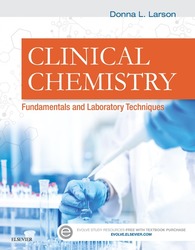「重要なお知らせ:日本語書籍をご購入いただき、eLibraryをご利用の皆さまへ」
エルゼビアは、より快適にサービスをご利用いただくため、システムの重要なアップ
デートを実施いたしました。
現在eLibraryで日本語電子書籍をご利用のお客様は、今後より高いアクセシビリティとセ
キュリティを備えた新しいプラットフォーム「eBooks+」へアカウントが移行されてい
ます。eBooks+のご利用については
こちらよりご利用・ご登録ください。
Book Description
Gain a clear understanding of pathophysiology and lab testing! Clinical Chemistry: Fundamentals and Laboratory Techniques prepares you for success as a medical lab technician by simplifying complex chemistry concepts and lab essentials including immunoassays, molecular diagnostics, and quality control. A pathophysiologic approach covers diseases that are commonly diagnosed through chemical tests — broken down by body system and category — such as respiratory, gastrointestinal, and cardiovascular conditions. Written by clinical chemistry educator Donna Larson and a team of expert contributors, this full-color book is ideal for readers who may have minimal knowledge of chemistry and are learning laboratory science for the first time.
- Full-color illustrations and design simplify complex concepts and make learning easier by highlighting important material.
- Case studies help you apply information to real-life scenarios.
- Pathophysiology and Analytes section includes information related to diseases or conditions, such as a biochemistry review, disease mechanisms, clinical correlation, and laboratory analytes and assays.
- Evolve companion website includes case studies and animations that reinforce what you’ve learned from the book.
- Laboratory Principles section covers safety, quality assurance, and other fundamentals of laboratory techniques.
- Review questions at the end of each chapter are tied to the learning objectives, helping you review and retain the material.
- Critical thinking questions and discussion questions help you think about and apply key points and concepts.
- Other Aspects of Clinical Chemistry section covers therapeutic drug monitoring, toxicology, transplantation, and emergency preparedness.
- Learning objectives in each chapter help you to remember key points or to analyze and synthesize concepts in clinical chemistry.
- A list of key words Is provided at the beginning of each chapter, and these are also bolded in the text.
- Chapter summaries consist of bulleted lists and tables highlighting the most important points of each chapter.
- A glossary at the back of the book provides a quick reference to definitions of all clinical chemistry terms.


 (0 rating)
(0 rating) 






